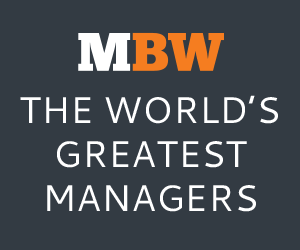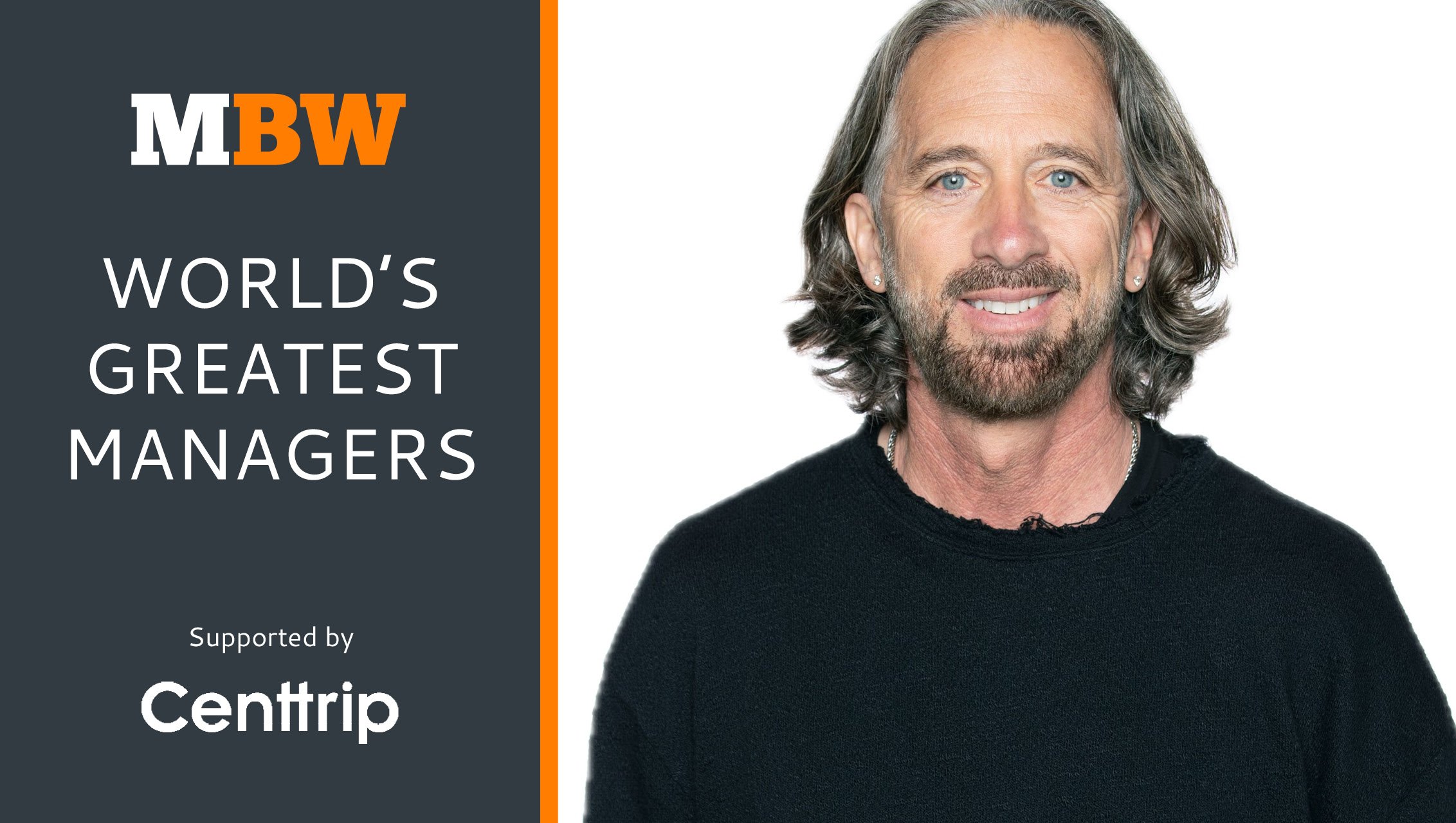MBW’s World’s Greatest Managers series profiles the best artist managers in the global business. Chris Woltman is the long-serving manager of Twenty One Pilots, one of the biggest alternative rock bands of the last 15 years. He talks about breaking the band, staying at the top, building a roster at his Element1 management company, and launching a new label, ARRO. World’s Greatest Managers is supported by Centtrip, a specialist in intelligent treasury, payments and foreign exchange – created with the music industry and its needs in mind.

Chris Woltman takes a call from his artist.
It’s 2015 and Woltman’s management clients, Twenty One Pilots, are the hottest band on the planet, enjoying a massive breakthrough hit with Stressed Out, taken from their fourth album, Blurryface. The song is No.2 on the US Hot 100, it’s all over the radio, it’s going gangbusters on this new-fangled thing called streaming and it’s a Top 10 hit around the world. Which is why Tyler Joseph, back in his Ohio hometown of Columbus, is calling.
“Everywhere I go, I hear my voice,” says the somewhat bewildered frontman.
Some managers might have pushed for the band to squeeze last every drop from this moment. But Woltman – secure in the knowledge that he had already helped build the band to arena level before Stressed Out’s ubiquity – chose a different path.
“It was an interesting moment,” says Woltman, with trademark laidback, deadpan cool. “Like, maybe the strategy here is not to push and push and push, but to shut it down. At that point, there was enough music in the market, so the fanbase that was coming in had to dig deeper. It really helped to spread the success of all that music. There might have been a bit of magic in that moment.”
And magic moments have been a specialty for Twenty One Pilots – and Woltman’s Element1 management agency – ever since. Despite rock’s issues with gaining traction in the streaming age, TOP have consistently remained one of the biggest draws in the genre.
Their Clancy tour, which concluded its most recent leg with two spectacular sold-out dates at London’s cavernous O2 Arena in May, shifted over 1.1m tickets across a run that included the band’s first stadium headline show in South America, as well as huge gigs across North America, Europe and Australasia. Another tour kicks off in North America in September.
The Clancy album went Top 3 on both sides of the Atlantic and around the world, amazing more than one billion streams, while the follow-up, the band’s eighth album Breach, is due in September. Lead single, The Contract, has already racked up more than 20 million streams on Spotify alone.
It’s an old-school tale of long-term artist development and slowburn success, and Woltman’s own path to the top has been a similar story of constant incremental upwards momentum.
Although now based in California, Woltman – like his most famous charges – hails from Ohio. Indeed, he started his career promoting shows at Columbus’ legendary 1,700-capacity Newport Music Hall, the very venue that TOP once dreamed of selling out (a feat they managed in 2011).
From there, he moved into the label world, first as a college rep for Sony, then in increasingly senior roles at Columbia Records. Clive Davis headhunted him for J Records and he eventually became SVP of Rock for RCA, working with the likes of Foo Fighters, The Strokes and Kings Of Leon.
But, with the wider recorded music business burying its head in the sand over the post-Napster slump, he saw the potential for digital music and left Sony, setting up Element1, initially as a label and management company, before concentrating on management from 2011. As well as TOP, Element1 now also looks after platinum-selling rapper NF, rising rockers The Band Camino and various other artists, songwriters and producers.
“Making sure everything is marching to the beat of the same drum is an amazing challenge every day. But it’s exciting…”
Woltman is also making a return to the label business with ARRO, co-founded by him and Joseph. They have partnered with Atlantic on Balu Brigada, the opening act on Twenty One Pilots’ world tour, who have scored a No.1 US alternative airplay hit with So Cold.
“It’s excruciatingly hard work!” Woltman laughs as he contemplates his growing roster. “Making sure everything is marching to the beat of the same drum is an amazing challenge every day. But it’s exciting…”
There’s a big year ahead for all of Woltman’s clients. But before all that, he sits down with MBW to talk AI, A&R and TOP’s long road to the top…
WHAT’S THE SECRET TO MANAGING A SUCCESSFUL ROCK BAND IN 2025?
In the last 15 years, the ability for new bands to have success has proven to be a big challenge. That’s what makes it that much more fulfilling, to look at it and say, ‘Wow, somehow we’ve been able to thread the needle’.
But the more things change, the more they stay the same. In this industry, if your vision is for long-term, sustainable careers, what it’s always been about is still what it’s all about: make great bodies of work – a real record not just a single – get out on the road and really understand and stay committed to the idea of what community and fandom can be for your brand proposition. It isn’t about making a big break for a TikTok moment – if that comes, that’s great, but it’s an additive.
Look at Twenty One Pilots and NF. You don’t get 14 years into a career by skipping any steps. If you skip steps on years one, two or three, you’re probably going to put your business at risk. Even if you can take the jump, you don’t. It’s a lot of discipline!

WAS THAT DIFFICULT TO STICK TO WHEN TWENTY ONE PILOTS HAD A MASSIVE HIT WITH STRESSED OUT?
I could not be more proud of the fact that, when they were thrust into the zeitgeist of popular culture, we didn’t even really follow that up. In the US, before Stressed Out became a hit, we were already on an arena run that was 72% sold out. I love to put that out there; for people who really understand what that means, it’s a ‘Wow!’ statistic.
In Europe at that stage, the guys were at 5,000 or 6,000 tickets everywhere and we were able to ride through the success of all that. We did something really interesting coming out of that phase: we shut it all down, the website went dark, the guys came offline, we went dark for a year. There was a philosophy behind that as well, because there was all the success before there was all the success.
DID YOU ALWAYS EXPECT TOP WOULD BE THIS BIG?
The short answer is yes, but there’s more to it than that. Early on with the guys it was a conversation about, ‘Do you want to be the biggest band in the world or one of the most important bands in the world?’ And it was always [the latter].
The idea being that becoming one of the most important bands in the world would lead to a long-term career and to a global fanbase that was as passionate as this fanbase has now proven to be.
I don’t want to sound like, ‘Oh, we knew 14 years later it was going to be as big as this’ – you don’t know that. But when I look back, everybody showing up every day and putting all their effort into it, gave a sense of confidence that this was going to be something really special.
HOW IMPORTANT WAS YOUR EXPERIENCE AT LABELS WHEN IT CAME TO BECOMING A MANAGER?
Being in the label world for those years has proven to be invaluable when it comes to forming my philosophy. I was really fortunate to work for people at Columbia Records in particular, who gave me a chance to put some of those philosophies in play and build careers along the way.
Even working in concert promotion, I was exposed to things like settlements, load-in and catering – whatever it was, I saw it all on the ground and in real time. As I moved across to the label side, I touched on so many different categories of what it takes to run a business.

At the time, I don’t think I knew it, but I look back and think, ‘How lucky was I that people would share what they do and allow me a deep dive into their view on it?’ It led to a career which went through radio promotion, distribution, marketing, A&R and even a little bit of finance – it put me in the best position to have as much knowledge as I possibly could.
To say it was invaluable and that it formed the pillars of everything that has helped me along the way, is an under-statement.
WHY DID YOU LEAVE THE LABEL WORLD?
I’m not going to call it a crystal ball vision, but I’d gotten to the point where management always intrigued me; the idea of sitting within the center of an artist’s career and working with the stakeholders that actually have a hand on the wheel was always intriguing.
There was an era when a lot of a manager’s job was just to get an artist signed to a major label and then let the major label do whatever they were going to do. But when you get to the early 2000s, the recorded sector was cratering on every level. They had not, as an industry, looked down the road to see what their role could be or should be.
Management has taken on a greater functionality; you sit within the core of the brand and you work with your agents, your promoter partners, your label and music publishing partners, and others within the totality of the business.
And, most importantly, a manager’s job at its very core is to be the last guard at the gate for the artists that they work with in terms of their art. That’s a pretty deep responsibility; you have to make sure you protect that, because that’s the most important piece of the puzzle.
MANY MAJOR LABELS ARE RESTRUCTURING: DO YOU WORRY THEY’RE STEPPING AWAY FROM ARTIST DEVELOPMENT?
Well, they have stepped away from it. The distribution part is now so significant for new artist signings, it has changed the economics of a label.
We’re in the midst of this economic restructuring relative to what an artist position is and what the artist gets out of a record. The days of the 14-point royalty filled with all sorts of recoupables is winding down. Which is going to add an additional challenge: if the upside for a label is now not as significant as it was in the past, then how does all of this heavy lifting play itself through and what does it take to do that?
“artist and management have to set the pace and have to be prepared to re-invest in their careers because, ultimately, it is their career.”
There are some labels that do understand the importance of building a career. Does it mean that you can’t have quick hits and there aren’t artists and songs that come and go? No. But that, coupled with a commitment to artist development, ultimately makes the most robust roster in the world.
But artist and management have to set the pace and have to be prepared to re-invest in their careers because, ultimately, it is their career.
SO, DO ARTISTS STILL NEED LABELS?
Yes. Because there’s something about the magic of a label, whether that is a traditional label set-up or a distribution model. However it defines itself, when you get up to the starting line and you hit go, the idea of being able to corral a global partner and the level of communication and push that goes into that… There is tremendous value in that moment.
The flip side of that is, you can’t rely on the label to fund your business and drive those core principles of making great records, getting out on the road and touring and building a community.
There are very defined pieces of the puzzle that labels do and still do very well. And then there are things that labels don’t do very well and that’s where you need to make sure you’re doing them.
IT’S BEEN A TOUGH FEW YEARS FOR ROCK MUSIC. IS IT COMING BACK NOW?
Some people are arguing that the pendulum is swinging back because, while hip-hop was so dominant, now you’re looking at country, which is working all around the world, including parts of the world where it never worked in the past.
So hopefully the pendulum is going to swing back – I look at TOP’s streaming numbers every week, and the numbers are massive.
On this tour, Tyler does this thing on the song Ride, where he brings a fan up and they get to sing part of the hook with him out on the B-stage. Every single one of the kids he has brought up wasn’t born when the first Twenty One Pilots record came out. But there they are with the mask or the make-up, the yellow tape or the red tape. At 12, 13 or 14, they’re the next generation of fandom. It’s fascinating to see that.
TWENTY ONE PILOTS ARE A BIG STREAMING SUCCESS. BUT DO THEY MAKE ENOUGH MONEY FROM STREAMING?
No. When you look at the economics of streaming and what an artist brings to the table, feeling the artist deserves more of that revenue is a valid argument to continue to have. Whether it’s the platform or the label or whoever, it all starts with what these artists do. Music is the lifeblood of it all.
“On the recorded side, the economics are clearly shifting, so it will be interesting to see where it lands in the next couple of years.”
On the recorded side, the economics of that world are clearly shifting, so it will be interesting to see where it lands in the next couple of years. Those economics are changing for the betterment of the artists and that’s going to prove to be valuable.
Any way you cut it, it starts with the people who are making these songs and have that vision and see those songs through. Making sure that they are compensated properly is an on-going quest. We’re in the middle of that sea change but it’s moving in the right direction.
DO YOU WORRY ABOUT WHAT AI WILL DO TO ARTISTS’ CAREERS?
I’m not worried. The emotion of a great song, an artist delivering that great song in a studio, writing lyrics that are about the human condition and then getting out on the road and delivering that experience every night… Those things still require extremely talented people.
They can press a button and it can sound like Twenty One Pilots, but it’s not. Whether it’s a fine line or a massive gap between being able to press that button and sound like [an artist] versus sitting down, writing those lyrics, getting into the studio, struggling through how those lyrics, the melody and the production come together in the studio – those things still hold true.
THERE ARE STILL A LOT OF ACQUISITIONS HAPPENING IN THE BUSINESS. HAVE YOU HAD ANY OFFERS FOR ELEMENT1?
Yes. I can’t say I’m not interested at all, but the idea of being able to run your business how you want to run it, even if you’re involved in a partnership, is key.
I like to run where I’m at independently. I’ve got some partnerships that are part of it, but I run my business how I run my business and that part is good, so I’m happy with where it’s at.
HOW BIG DO YOU WANT YOUR NEW LABEL TO BE?
When the potential to sign something feels right, then we will. And there are so many moving parts in the idea of something feeling right.
There’s no mad rush to go out there and have this big roster. If an artist comes along tomorrow that fits into the total picture, then we’d be in that conversation. It’s not that dissimilar to how the roster has developed on the management side – it will come when it comes.








